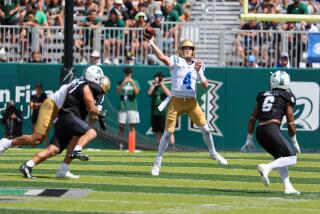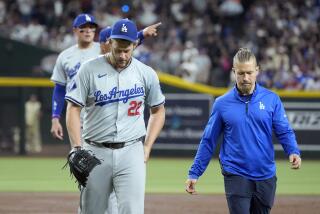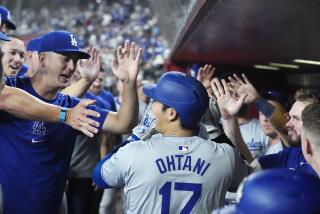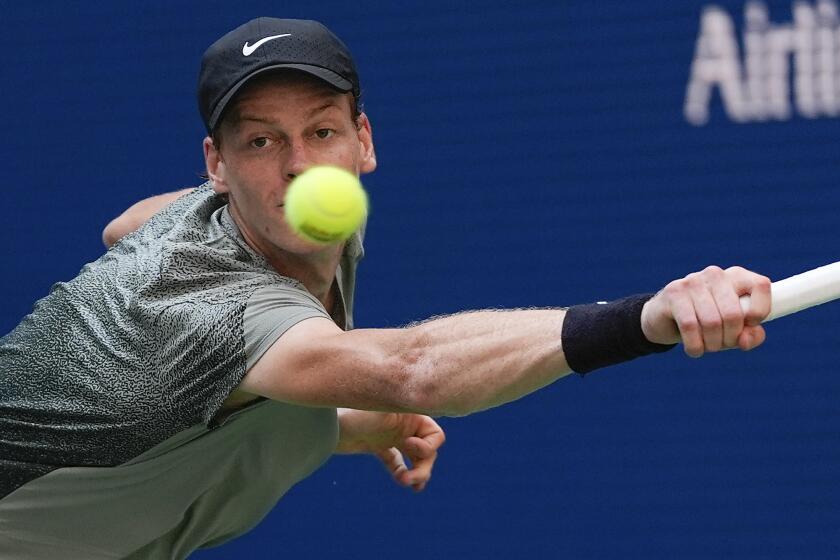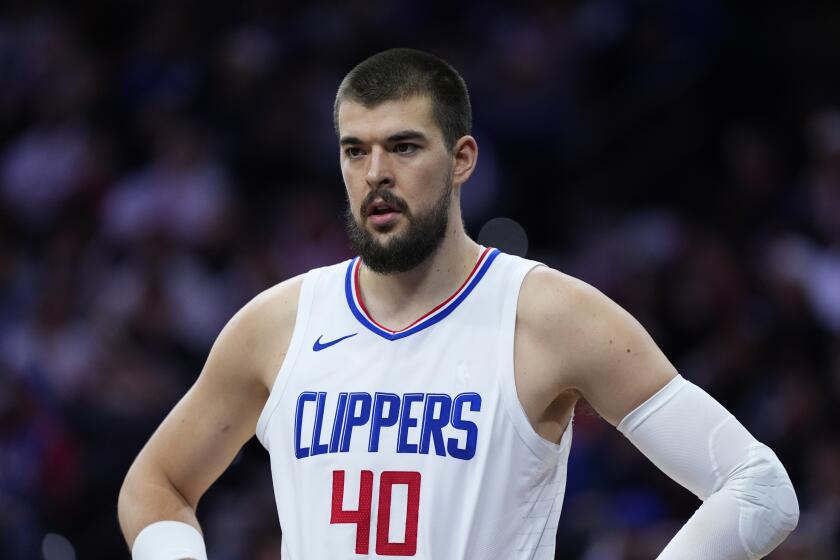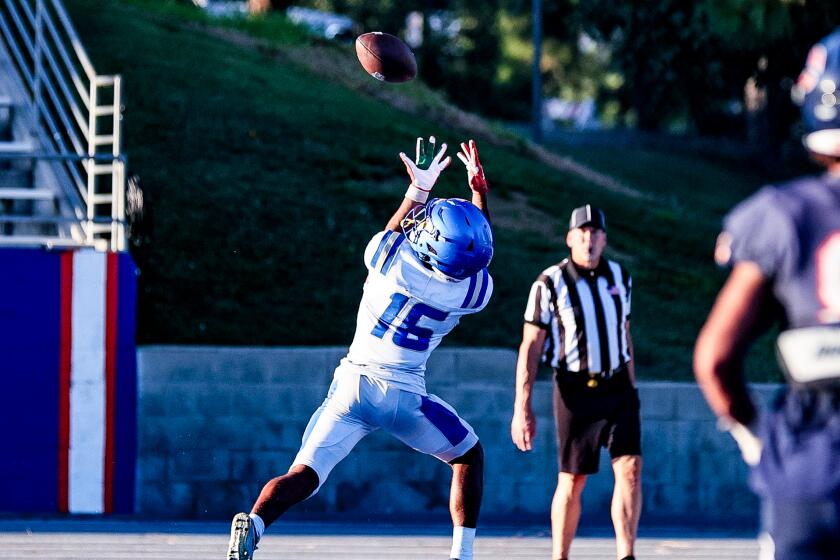Pumped Up : Dodger Catcher and 1993 Roockie Phenom Mike Piazza Spent the Off-Season Lifting Weights, Building Confidence So He Can Ward Off the Dreaded Sophomore Jinx
MICHAEL JOSEPH PIAZZA’S EYES SMOLDER WITH DEFIANCE. HE GLISTENS from two hours of pumping iron, his cheeks flushed with adrenaline. Now, the final exercise. He scoots his sweat pants up to his knees. He steps his 220-pound, 6-foot-3 frame onto a tiny metal platform in front of a mirror and rises on his toes to flex his calves. He gazes. He scowls. “Bird legs,” he grumbles.
For 23 minutes, Piazza, statistically the greatest rookie catcher ever, the most exciting Dodger since Fernando Valenzuela, works his calves with weights and leg lifts. He’s pumping iron against the wishes of his father and his team manager. His voice is hoarse, concerned. “This is not for baseball . . . or my father. This is for me, the girls . . . the beach.” Piazza eyes his calves again and sighs, “I have flamingo legs.”
Sure, OK, in Piazza’s 25-year-old world of cyborg prowess and power, his legs must seem spindly under massive shoulders, biceps and forearms that bulge and ripple with a twitch, a flick of wrist.
Those muscles produced extraordinary numbers in 1993. His 35 home runs are the most ever by a major-league rookie catcher. His 112 RBIs are third highest by a National League rookie. His .318 batting average led the team and was seventh highest in the league. Defensively, Piazza threw out 58 base-stealers, which set a Dodger record and was highest in the major leagues. He was named to the Associated Press and United Press International All-Star teams, and was awarded National League Rookie of the Year by the Baseball Writers Assn., only the ninth unanimous decision in the award’s 47-year history.
“He has the strongest set of hands I’ve ever seen,” says former Dodger catcher Mike Scioscia. “Piazza is so strong . . . so powerful.”
Physically, Piazza is Robocatcher. Emotionally, Piazza is an intense perfectionist given to tantrums and smashing bats and helmets.
In essence, Piazza is a hothouse tomato nurtured and cultivated by his father, a high-school dropout who parlayed a used-car lot into a $100-million empire. Vince Piazza, 60, deservedly self-indulgent, admittedly obsessive, shamelessly self-centered, boasts without hesitation: “It was me that gave Mike the tools. I’m living my life through him.”
Vince decided that his son--like it or not--”was gonna play baseball.” When Mike was 11, Vince fashioned a batting cage from scrap wood outside their first home in Phoenixville, near Philadelphia. Mike hit 200 to 300 balls each day--rain, shine, sleet or snow. Aluminum bats shattered from the cold. Wooden bats splintered from Mike’s growing power. Vince, in his euphoria, would whisper: “Dear God, is it possible?”
Vince left nothing to chance: Money, influence, his boyhood friendship and business dealings with Tommy I-Bleed-Dodger-Blue Lasorda, when necessary, to get his son into colleges, the minors and, eventually, the Dodgers. “Vince Piazza spends so much time on the field and around the dugout; he’d like to be wearing a uniform,” says Johnny Bench, the Cincinnati Reds catching legend and Hall of Famer who covered baseball for CBS Radio. Young Piazza cringes at his father’s incessant puppeteering. “Nobody really knows the bitterness, the adversity, I went through,” Mike says. He quit the Dodger organization in a snit in 1990, claiming that he was being tormented because of Lasorda’s perceived favoritism. After talking to Lasorda and Dodger management, he returned to the team.
Now Piazza must face the improbability of back-to-back miracle years, also known as the second-year wheeze, the sophomore jinx. The jinx is well-founded statistically and a dreaded curse in superstition-steeped baseball. Consider this: Since 1970, 18 of 35 non-pitcher rookies of the year have dropped at least 17 points in their second-year batting averages.
“Now we’ll see what this Piazza kid’s made of,” says Yogi Berra, the New York Yankee Hall of Fame catcher who has seen more than one rookie rocket crash and burn for lack of guts and grit.
Adds Johnny Bench: “This kid didn’t get that power, that arm, put up those numbers, from reading his name in the newspaper.” But he cautions: “The big thing mentally the second year is you’re starting from zero. If you don’t get off to a good start, well, I don’t know what’s inside Mike Piazza’s head.”
Piazza ponders the 1994 season after a grilled chicken dinner at his parents’ Valley Forge, Pa., home, where he spent much of the off-season. He wears designer jeans and T-shirt. His voice is firm. “I don’t care about the sophomore jinx. I’m not impressed . . . just go out and don’t give a s- - -. It’s not the end of the world.”
He pauses, nibbles warm banana bread baked by his mother, brushing crumbs from a weak Fu Manchu: “Life, sports, everything is relative. My first job is to catch. My priority is to be strong defensively . . . win ballgames, not just to duplicate what I did last year. My thing to do is to first help the ballclub behind the plate. Catching keeps my feet on the ground. In a strange way, being a good catcher helps my hitting, takes the pressure off me. I’m gonna do just what I did last year. This year I’ll know the pitchers, be more relaxed, I’ll do better. I know I can do it. My philosophy is, if it’s not broken, I’m not gonna fix it. I’m confident in my ability and my work ethic.”
PIAZZA BEGAN HIS CAREER HITTING BALLS AGAINST MATTRESSES IN THE basement of his home. Then his father built the outdoor batting cage. “It would get so cold, we would have to warm the bats and balls by the stove and wrap pipe insulation around the bat handles,” Vince says.
Vince took other measures to enhance Mike’s success. He strengthened his relationship with Lasorda, a boyhood friend in Norristown, Pa. He leased a building for a restaurant owned by Lasorda’s three brothers and “put Tommy into a car dealership” in Pennsylvania. The car dealership, Vince says, was sold and Lasorda took a profit.
When the Dodgers visited Philadelphia, Mike was the batboy. When Mike was 16, Vince tracked down hitting great Ted Williams, who was visiting a town nearby, and drove him to the Piazza house to coach his son for an afternoon. After Mike’s graduation from high school in 1986, Vince persuaded Dodger bullpen coach Mark Cresse to let Mike live in his California home for part of the summer and attend Cresse’s baseball camp.
“I’ve known Vince for 20 years,” Cresse recalls. “I did it as a favor. Our first objective was teaching Mike to play first base because he had grown quite a bit and it was a coordination thing . . . awkward. His body hadn’t caught up with his legs yet. First base was the best place to hide him defensively.”
Then the Piazzas turned to Lasorda to get Mike into the University of Miami, a top baseball college. “Tommy knew the coach,” Mike recalls. “Tommy stuck his neck out to get me on. I couldn’t fit into the program. I didn’t even make the travel team. One of the things I did wrong was rely too much on Tommy. We put all our eggs in one basket. I should have gone to another school where I would have played more.”
Piazza was disillusioned, demoralized. “I asked Tommy to call the coach at Miami Dade North Community College. I became the starting first baseman there.”
But near the end of the 1988 season, a collision split two knuckles and tore ligaments in Piazza’s left hand. “I went home,” he recalls. “My father asked: ‘What do you think about becoming a catcher? It’s your best chance at making the majors.’ ”
The Piazzas called on another Dodger, former catcher Joe Ferguson, now an assistant coach with the team. After a 10-minute tryout, Ferguson told Lasorda and the Piazzas, “The kid’s got the arm. You can’t teach arm strength. He can be a catcher.”
Piazza got a break in the fall of 1988, when the Dodgers used their 62nd draft choice on him. “It was a meaningless courtesy pick,” Piazza concedes. “But it would look good on my resume.” Vince offered to pay for his son’s airplane ticket to Los Angeles if Dodger scouts would watch Mike hit and catch. Lasorda was warned not to meddle.
Pitching to Piazza was an old friend. “Cresse helped me out. He threw me good pitches.” Cresse remembers: “Didn’t matter what I threw him. Piazza crushed me.” The Dodgers offered a $15,000 signing bonus. “I was finally a professional baseball player,” Piazza recalls with pride.
Now Piazza had to learn to be a catcher. Lasorda called in more favors. Piazza was sent to Campo Las Palmas baseball academy in the Dominican Republic. Here’s the rub: “This camp,” according to Dodger publicity, “is dedicated to the youth of the Dominican Republic . . . “ No Americans needed. Piazza became the camp’s first American--without the knowledge of Charlie Blaney, director of Dodger minor league operations.
“I wanted to keep it low profile,” Lasorda explains. “Blaney’s got nuthin’ to do with me. That kid had talent.”
“It was the only place to go,” Piazza says. He went home six weeks later, at Christmas, complaining of food poisoning.
He went to spring training in Florida in March of 1989. “I got the flu. I didn’t make the team.” He was sent to the rookie-league Salem Dodgers in Oregon in June of 1989. “I started hitting. I made starting catcher.”
He was promoted to the Single-A Vero Beach Dodgers in March, 1990, as first-string catcher. Piazza says he lost the starting spot in June, partly because he got mononucleosis. But the real reason, he insists, “was political. Coach (Joe) Alvarez didn’t like my attitude. Said I was not rah-rah enough.” Piazza says Alvarez ridiculed him publicly, daring him to call Lasorda. “I asked Alvarez why he was treating me like this. And Alvarez said, ‘I was ordered to play with your head.’ ” Piazza threw a fit. “I was pissed off enough not to want to play baseball anymore. Screw it. I walked out and went home to pack.”
Within hours, “Charlie Blaney called me and said what a terrible thing I had done by walking out.” Lasorda called Piazza. Blaney called back. “He said he had a meeting,” recounts Piazza, “and if I paid a $250 fine and apologized to the coach, I could go back.”
Recalls Lasorda: “I told them, ‘I don’t want you jerking that kid around.’ ”
Recalls Blaney: “It’s true that Tommy didn’t tell me Mike went (to the Dominican Republic), but Tommy’s the major-league manager and whatever he wants to do is OK with me.
“Mike in those early years was not a proficient catcher. Tommy was right on that one. No problem with me and Tommy on that one. I don’t tell any (minor league) managers to play with anybody’s head. Mike is still here and Alvarez isn’t. I let him go at the end of the season. What happened with Mike is part of it. But Michael did jump the club after a game. Mike was trying to be his own man. I told him, and Tommy (told) him: ‘You don’t jump the club.’ Mike realizes that now.”
Alvarez, who spent 10 years with the Dodgers, now manages the Lotte Giants in Pusan, Korea. “I was told by Mr. Blaney that Mike Piazza was supposed to share the catching spot. His father had one discussion with me. He said, ‘I want my kid to play more. My kid should be getting more playing time.’ Mr. Piazza was a gentleman, but I had a whole team to manage. I had to treat everyone equal.
“Mike considered himself a free spirit. He had his own ideas. I had mine. Next thing I know, Mike walks out, jumps the club, after a game. I called Tommy Lasorda. Tommy said, ‘Joe, I’m not taking any sides. It’s your club. You did what you had to do. I would have done the same thing.’ ”
Alvarez adds: “Maybe I made a mistake, but I did what I was told to do--treat Mike Piazza like anybody else, an equal. Sure, four years later, Mike is Rookie of the Year. Hindsight is 20-20. Physically, Mike has all the tools. Mentally, I believe Mike is his own worst enemy. Time will tell.”
After Vero Beach, Piazza went to the Single-A Bakersfield Dodgers, where he led the Dodger minor-league system with 29 home runs in 1991. The next year, he was promoted to the Triple-A team in Albuquerque, where he hit a team-high .341 in 94 games. Suddenly, last year, Piazza got his chance. Scioscia, the popular veteran catcher, left as a free agent when the Dodgers refused to guarantee him the starting position. Piazza beat out two other catchers for the spot in spring training.
SPRING TRAINING THIS YEAR IS QUITE DIFFERENT FOR MIKE PIAZZA, superstar. He has just signed a $4.2-million, three-year contract, the second largest in baseball history for a second-year player. The first day, Piazza enters the batting cage trailed by reporters and curious Dodgers. Towering above the swarm is 6-foot, 6-inch Darryl Strawberry. During spring training, Piazza will bat third in the lineup, Strawberry fourth. They’re going to be the Dodger power combo, in theory, when the team’s season opens April 5 against the Florida Marlins. The Dodgers have been struggling the last two years because of Strawberry’s missing bat, shaky relief pitching and an error-plagued infield.
Lasorda is optimistic this year as he watches Piazza and Strawberry warm up. Piazza smacks line drives. Then he hits two dribblers. Piazza talks to himself. Strawberry winces. Piazza blasts eight rifle shots in a row. Strawberry’s eyes crinkle. He turns to the throng of reporters, faces upturned, pens poised. His tone is condescending: “With Piazza batting third, and me fourth, we’ll have a real power lineup this year.” Reporters scribble. Noses twitch skeptically. Last year, Piazza carried the batting order. Strawberry, suffering back problems, played only 32 games.
Inside the clubhouse, Lasorda pulls on his skivvies and Dodger blue high-top socks. He announces: “Mike Piazza is one of the great success stories in this country. Here’s a guy that nobody wanted. That young man had to go through quite a lot. People told me that I was wasting my time.” Lasorda clenches his fist. His voice becomes a growl. “But I know my business! He’s no fluke. He’s got the best batting mechanics around. I begged our people to draft him. Nobody wanted this guy.”
As for his business dealings with Piazza’s father, Lasorda says coolly: “Sure. He made money for me. So what? I put up money, but how much doesn’t need to be public. Vince Piazza and I are close personal friends. If anybody should (get credit), it should be Vince. We should be honoring him. He was the guy who directed Mike, motivated Mike, worked with him every day. He taught Mike dedication, determination and discipline. This kid ain’t gonna have no sophomore jinx. There’s no such thing as a sophomore jinx.”
Agreeing with Lasorda in spirit is “Super” Joe Charboneau, a 1980 rookie-sensation outfielder for the Cleveland Indians. A character, Charboneau dyed his hair red, white and blue, opened beer bottles with his eye socket and inspired a hit disco song, “Go, Joe Charboneau.” He batted .289, with 87 RBIs and 23 home runs. He was out of the majors within two years.
Charboneau now runs a baseball school in suburban Cleveland. “I was having an excellent second year in spring training,” he recalls. “Then I dove headfirst into second base. I ruptured two discs in my back. I had injections and prescription muscle relaxers. I was medicated heavily. I knew when the season started I wasn’t prepared. The Indians wanted me to keep playing. In those days they expected you to play. It ended my career.”
Charboneau’s advice to Piazza: “There is a Santa Claus, but there is no sophomore jinx. I don’t believe in it. Just don’t overtrain. I was a pro boxer. A lot of guys leave their fight in the gym, the weight room.”
Hobbling Piazza this season has become the National League’s cottage industry. “Now they’re gonna go after him, looking for holes,” says Yogi Berra. “Pitchers are gonna start working on him.”
Pitcher Pete Harnisch of the Houston Astros is typical. “Hey, Piazza doesn’t have any big holes by any means. He uses a freakin’ redwood as a bat. He hurt us as a team. He can ruin your day. I don’t know if ‘sophomore jinx’ applies to Mike Piazza. But we have a plan, an idea, how to pitch to Piazza, but I’m not going to tell you.”
Observes Dodger Coach Cresse: “There’s no way to say for sure how Piazza’s going to do this year. There’s no sure thing. It’s scary. Look at (Eric) Karros,” he says, referring to the Dodger first baseman who was 1992 Rookie of the Year, when he batted .257 with 20 home runs and 88 RBIs. In his sophomore year, Karros’ batting average fell to .247 and, although he hit 23 homers, his RBIs fell to 80. “He tried to live up to media expectations and didn’t have the best year. I hope Mike doesn’t do like Karros . . . all this media exposure.”
Piazza realizes mental toughness may decide his fate. “I’ve got to learn to keep it a game.” Piazza is harder on himself than necessary. After a bad day, or a bad play, he might rant, rave, sling water jugs, slam batting helmets. He broke so many helmets on the road, when the team carries a limited supply, that the Dodgers became concerned. Once, Piazza made a bad throw to second and hit Dodger pitcher Tom Candiotti on the butt. Dodger pitchers wore paper bull’s-eyes on the backs of their pants at the next game. Piazza wasn’t amused. “Mike was screaming and cursing,” recalls Karros, who shares a Manhattan Beach apartment with Piazza. “He takes it so personal, so serious.”
Another time, Piazza learned that his girlfriend was accidentally denied admittance by Dodger security. “I broke bats, smashing things, breaking things against the wall,” Piazza recalls sheepishly. “I ran through the underground tunnel screaming, swearing. I said some threatening things.”
VINCE PIAZZA SLOWS HIS MERCEDES and points to the crumbling remains of a shack in a stand of trees. “That’s where I grew up,” he mutters. The son of an impoverished welder, he quit school at age 16 to help provide. He was an Army corporal in Europe during the Korean War. “Then I worked nights at the B.F. Goodrich tire plant . . . fixed up used cars during the day and sold them.”
By 1968, he had amassed $35,000. Datsun was offering dealerships if you had $1,000 in cash for parts. Soon Piazza added Honda to his growing Datsun dealerships. Then came the fuel crisis of the early 1970s. Gas-guzzling American cars caused many dealerships to fold. Piazza swooped in and gobbled up choice bankrupt franchises and, more important, the real estate. “I knew American cars would come back eventually.” By 1992, Piazza owned about 50 dealerships across the country. He expanded into real estate and a computer service company, Phoenix Technologies, now with 66 offices nationwide. The computer business generated $200 million in 1991.
“Once I had a couple armies (of money) behind me, I began to indulge my love of baseball,” Piazza says. He sold all but 20 of his dealerships, raised $25 million in cash, and for the last decade has tried to buy into the Pittsburgh Pirates, San Diego Padres and San Francisco Giants.
Since rejection of his 1992 bid for part-ownership of the Giants, Piazza and a partner, Vincent Tirendi, have filed suit against Major League Baseball, alleging violations of antitrust, civil rights and contract laws. He also charges in the suit that he was libeled and slandered in remarks by major-league officials hinting that he has links to organized crime. Baseball officials have retracted those comments. Piazza is still furious. “My lifelong ambition is to own a team, but I won’t allow those slurs to go unchallenged. It was an injustice.” The suit is pending in federal court in Philadelphia.
Vince Piazza hosts lunch at the Westover Country Club. He owns the place. Snow blankets the golf course. The parking lot and modest dining room are nearly empty. Seated with Vince are five friends and employees, and Mike. The luncheon is to discuss the Mike Piazza College Scholarship Fund for high school baseball players. Three months earlier, Vince spent $20,000 for a fund-raising gala. Twelve-hundred people attended. The event netted $25,000.
Vince wears a custom-tailored black wool suit and heavy gold Rolex watch with diamond-encrusted dial. He dominates the luncheon in style and presence. Vince speaks, the table listens. Vince eats, the table eats. Vince laughs, the table laughs. Vince is ebullient, animated. “We can do this every year with the theme that Mike wants to give back something to the community.” Heads nod. Good idea. “It’ll be a natural for the media,” Vince concludes. “We’ll call a press conference every year.” Heads nod. Good idea. Someone suggests awarding scholarships from the interest created by the fund so that it will be self-perpetuating.
Vince scowls and wags his finger. He doesn’t want the money sitting in a bank. Everybody scowls. Bad idea. Vince decides to distribute the $25,000 immediately among four local high schools. Better idea. Quietly, Mike chews turkey and stares at his plate. There is an uneasy silence. Vince asks softly: “What do you think Mike?” Mike shrugs. He’s concerned that if the coaches are allowed to control the money, they might play favorites, the media will find out and he’ll get bad press.
Vince’s eyes arch with alarm. “Mike’s right on this. How we gonna protect Mike?” The table buzzes with concern. Vince decides coaches can’t be trusted with total control so they’ll have to share responsibility with the high-school principals. Terrific idea. Mike shrugs. “Sounds OK.” Vince stands. The luncheon ends.
After lunch, Piazza heads for his alma mater, Phoenixville Area High School, to pay his respects. Today is the first meeting of the 1994 baseball team. His brother Tony is trying out for the varsity. “Nobody knows I’m coming,” Piazza says. “Not even Tony.”
“Why the secrecy?” I ask. Piazza sighs. “You’ll see.”
Autograph hysteria sweeps the high school. For nearly 30 minutes, Piazza signs hats, gloves, T-shirts, scraps of paper, balls, cards. His pep talk begins with: “Work your ass off . . . first one on the field, last one off . . . excuses are for losers . . . read every book on hitting and throwing.” The coaches nod, smile. Piazza continues: “Sure, go out and drink beer. I did it. I partied hard, but I knew when to go home. Go out, party, but always be in control . . . keep your dignity.” The coaches’ smiles vanish. They stare at the floor. Piazza ends with: “Remember to be your own person and be in control.”
The head coach, Doc Kennedy, holds up two color photographs of Piazza mounted on wooden plaques that are for sale at the school. “Normally, we sell (school) T-shirts to raise money for the team, but if we can’t push Mike this year, there’s something wrong.”
Piazza grimaces at the commercialization of his fame. Coach Kennedy turns to Piazza: “Is it OK if the players tell people if they buy a plaque, you’ll sign it?” Piazza tries to hide his irritation. His voice is strained. “Well, I’ll sign some of them.” Coach Kennedy unscrews the plexiglass over Piazza’s pictures and asks: “Could ya sign your name up the right leg on this one and across the chest on that one?”
Then Piazza autographs 30 blank cards, one for each student. “Coach says these are worth money,” a player whispers. Piazza signs a poster on the bulletin board. After the meeting, two assistant coaches and students rush home for pictures, cards and magazine covers. Piazza signs autographs for another hour. As we drive away, he mutters: “Think what would have happened if they knew I was coming--9 million kids and parents with 9 million baseballs and bats to sign.”
Piazza shakes his head in disgust. “I can make $10,000 an hour signing baseball cards at shows. The promoters line the kids up and you can sign 800 to 1,000 cards an hour and I get $10 to $15 a card. I did one show and it made me sick. I felt like a piece of meat with a pen. To sign an autograph strictly for money is a turnoff. It’s not worth the hassle. I just don’t like it. I don’t want to do it anymore.
“What’s happened is the value of my signature is really high. But it’s a turnoff to see little kids running up to you with a handful of cards they want signed in certain ways to make them more valuable, and two or three baseballs they want signed on the ‘sweet spot’ to make it worth more.”
PIAZZA IS HITTING BALLS IN THE basement batting cage in his parents’ home. He has programmed the pitching machine to throw sinkers at 88 m.p.h. “Sinkers are designed to make you hit grounders.” The balls come every 10 seconds from in front of a dull white, unlit wall. “I designed the backdrop to make the ball as hard to see as possible. When I go to spring training, the balls look like grapefruits.” He blasts the next pitch high into the netting. “That ought to drive a run in.” He smashes a line drive. “Hit to right.” He fractures the bat on the last pitch.
It is his last night at home before spring training. He eats takeout pizza in the kitchen and regales his mother, Veronica, with stories of making a commercial for Topps baseball cards.
“The director was really interested in my ideas,” Piazza says. He is relaxed, boyish with his mother. She is petite, attractive, quick to smile, but of few words. Piazza giggles. “It was so cool. The makeup people made a scratch on my face, jelly to look like sweat, like after a game. It was sooo cool. The director said to look tough--walk toward the camera looking tough . . . like this.” He glowers fiercely and strides across the kitchen, his powerful chest thrust forward. His mother forces a weak smile.
“Just how big is your chest?” I ask.
“Forty-six inches, I think.” He pauses. “Mom, go get a tape measure.”
He flexes while his mother measures: chest, 46 inches; biceps, 18 inches; forearms, 15 inches; waist, 33 inches; thighs, 25 inches. Piazza frowns. “My thighs could be bigger.”
It’s almost 9 p.m., time to leave for the gym. Tonight his muscle-building session is devoted to legs and thighs. “I spend four nights concentrating on a different part of my body,” he explains. “One night, chest, triceps; then back, biceps; then shoulders and, finally, legs, thighs. Then I take a night off.”
Piazza’s father enters. He sees the gym bag in his son’s hand. His face tightens. His voice is alarmed. “The gym again? Don’t overdo the weights! You’re doing too much! It worries me. You’ll lose your bat speed! Please!”
Piazza glares at his father and leaves. In the car, he sighs. His voice is muted. “I love my father, but he pushes me too hard sometimes. I need the gym, the weights, for myself.” In 1991, Piazza says, he went “ballistic for the first time” on weight training. “It was kind of addicting as I saw my power grow.” His compulsion with bodybuilding also concerns Lasorda; bigger muscles can slow flexibility, bat speed. “I told him to lay off the weights!” Lasorda has growled.
Piazza’s gym, Body Transit Fitness Center, is in Collegeville, 30 minutes from the Piazza home. It is 9:30. The gym is officially closed. Owner Marc Polignano stays to work with Piazza each night. “I have nothing but respect for Mike,” the owner says. “He’s where every professional athlete should be.”
Piazza hoists a barbell onto his shoulders and begins with 44 leg squats, slowly increasing the weight from 135 to 300 pounds. “He could probably do 350 pounds,” the owner whispers. “That puts him in an elite group.” Next, Piazza does 34 leg presses on his back, pushing weights ranging from 350 to 625 pounds at a 45-degree angle. His face contorts. A deep, throaty, guttural growl bursts from his mouth with each pump. “Come on! Go, big man!” the owner whispers hoarsely.
Piazza’s face glows. His eyes shine. “I was here New Year’s Eve and Christmas Eve,” he rasps proudly. During the two-hour session, he pumps iron some 253 times on eight different machines to strengthen his hamstrings, knees, lower back. “Some guys don’t have to do this,” he grunts. “I think I do.” He takes a breather. His chest heaves. “I do this for myself. It makes me feel strong, powerful . . . tough.”
Then he goes to work on his calves . . . for the girls.
VINCE, HIS WIFE, AND FOUR OF their five sons, Vince Jr., 26, Mike, Tony, 16, Tommy, 12, (Danny, 23, is away at college) gather in their spacious, cathedral-ceiling living room of white Italian marble floors and black marble fireplace. Their trilevel, 12,000-square-foot house sits on a bluff with a magnificent view of the Valley Forge National Historical Park. The Piazza estate includes stables, caretaker quarters and a farmhouse deemed a national monument. George Washington slept there during the infamous winter of 1777-78. This lavishness is new to the Piazzas. Despite their wealth, their lifestyle was unpretentious until they moved to Valley Forge Mountain seven years ago.
Over brandy at the living-room bar, Vince tries in vain to articulate his fixation with baseball, conceding that it helps explain his obsessiveness with Mike’s career. He glances at his two oldest sons. He makes small talk until, out of boredom, they wander out of earshot. He leans close and whispers, “I really don’t want to hurt my oldest’s feelings but, the truth is, when Vince Jr. and Mike were kids, I looked at both of them and asked myself, ‘Which one has the best chance of playing pro baseball?’ Mike was younger, 11, but bigger. I chose Mike. I pushed and pushed that kid. I was relentless. When other kids were going to the beach, I dragged him to the ballpark. As he got better, I drove him harder.” Vince’s eyes mist. His voice cracks. “I know he’s getting tired of me now.”
It is 10:30 p.m. Tommy, the youngest, enters the living room. Lasorda is Tommy’s godfather. Like Mike, he is big for his age. He has returned from his first skiing trip. His voice crackles with excitement. Vince smiles and listens patiently. Finally, Tommy sags. “I guess I’m gonna go to bed, Dad.”
Vince brightens. His voice is upbeat. “Tommy, how about hitting some balls first?”
Tommy’s eyes droop. “I’m kind of tired, Dad.”
Vince’s face and voice grow sad. “Aww, just hit a few, Tommy.”
Tommy stares dully. “Geez, I’m really tired.”
Vince is gentle but insistent. “Then we’ll hit some balls tomorrow, OK son?”
Tommy sighs. “Yeah, I guess so. OK.”
Vince stares through me. His eyes glitter. “Tommy can be like Mike. I can give him the tools.”
More to Read
Go beyond the scoreboard
Get the latest on L.A.'s teams in the daily Sports Report newsletter.
You may occasionally receive promotional content from the Los Angeles Times.
